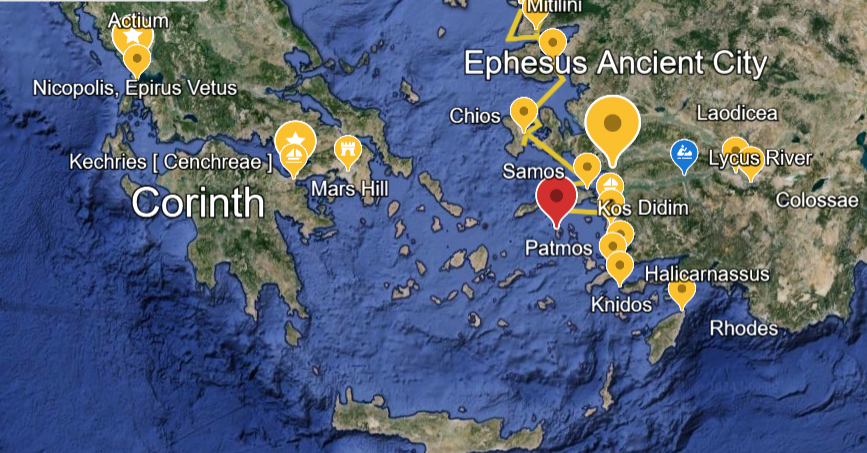in the year of our Lord ano Domini 55 [A.D. 55]
& in the context of the culture of Corinth
Intro
PREVIOUSLY in this Talk of Jesus series from CHURCH LETTERS - IS HE WRITING TO ME? we have glanced at a few of Paul's LETTERS (Epistles) to the Church written during his just completed missionary journeys.
TODAY we continue with a brief look back at more letters already sent to the churches.

WHAT THE CHURCH HAS READ SO FAR:
Just a reminder that all dates from reliable sources may vary but are used for chronological context only.
- A.D. 49 – JAMES, the half-brother of Jesus and leader of the church in Jerusalem writes his LETTER
- James also sends out a letter to the churches concerning gentiles from the Council in Jerusalem.
- A.D. 49 – Paul writes his letter to the Galatians (actually, several new churches in Galatia)
- A.D. 50 – 1 THESSALONIANS
- A.D. 51 – 2 THESSALONIANS
- during the A.D. 50’s or A.D. 60’s (actual date unknown) – The GOSPEL OF MARK
1:1 Ἀρχὴ τοῦ εὐαγγελίου Ἰησοῦ Χριστοῦ υἱοῦ τοῦ θεοῦ
The beginning of the gospel of Jesus Christ, the Son of God – Mark 1:1
Consider the possibility that parts of the Gospel of John Mark, who had accompanied his uncle Barnabas and the Apostle Paul to Cypress, MAY HAVE been known even in Corinth where Paul has already travelled and whose FIRST LETTER we are about to examine.
The GREAT COMMISSION of JESUS CHRIST to the CHURCH is recorded in the Gospel of Mark 16:15

1 Corinthians:
This epistle was most likely written in the first half of A.D. 55 from Ephesus (16:8, 9, 19) while Paul was on his third missionary journey. The apostle intended to remain on at Ephesus to complete his 3 year stay (Acts 20:31) until Pentecost (May/June) A.D. 55 (16:8). Then he hoped to winter (A.D. 55–56) at Corinth (16:6; Acts 20:2). His departure for Corinth was anticipated even as he wrote (4:19; 11:34; 16:8).
John MacArthur :: Bible Introductions – 1 Corinthians
Paulus vocatus apostolus Christi Iesu per voluntatem Dei et Sosthenes frater
– 1 Corinthios (1 Corinthians) 1 :: Latin Vulgate (VUL)
in the context of the culture of Corinth
CORINTH, ACHAIA is ROMAN; not Macedonian (as in the former Empire of Alexander the Great).
Neither is the large city of Corinth simply Greek, as in ‘ancient Greece’ with ancient Athens whose glory had long ago been reduced to ruins.
In 146 BC, the battle of Corinth signified a defining moment in the history of ancient Greece. Situated on the narrow strip of land connecting the Peloponnese to the mainland of Greece, Corinth was a city-state with a significant strategic and economic position.
source:
The language of Greek (thanks to the Great Macedonian Alexander) has become the international language of the Roman Empire.
So in Corinth, Philippi, Ephesus, Antioch and even in Jerusalem the GOOD NEWS and Epistles [Letters] typically were written and read in GREEK.
Παῦλος κλητὸς ἀπόστολος Ἰησοῦ Χριστοῦ διὰ θελήματος θεοῦ καὶ Σωσθένης ὁ ἀδελφός
Α΄ Κορινθίους (1 Corinthians) 1 :: Textus Receptus (TR)
Paulos klētos apostolos Jēsous Christos dia thelēma theos kai Sōsthenēs ho adelphos;
To the church of God which is at Corinth,
to those who are sanctified in Christ Jesus, called to be saints,
with all who in every place call on the name of Jesus Christ our Lord, both theirs and ours:
1 Corinthians 1:2 NKJV
Here in CORINTH we immediately read the opening of Paul’s Epistle written in Greek to the CHURCH, beginning with the Apostle’s universal greeting to ALL and specifically to the saints separated to the calling of Christ Jesus our Lord.
Paul had been there and wrote back to encourage these Christians in Corinth.
See if this A.D. first century city of CORINTH sounds vaguely familiar to any city of destruction in our 21st century the Common Era.
Once again, the commentary of John Macarthur on the culture of Corinth.
Even by the pagan standards of its own culture, Corinth became so morally corrupt that its very name became synonymous with debauchery and moral depravity.
To “corinthianize” came to represent gross immorality and drunken debauchery. In 6:9, 10, Paul lists some of the specific sins for which the city was noted and which formerly had characterized many believers in the church there.
Tragically, some of the worst sins were still found among some church members.
John Macarthur Commentary – the Background and Setting of Corinth
Here the Apostle writes to a chosen few SAVED from the surrounding sinful culture of CORINTH (and most every other city in their culturally correct Roman Empire) in a CHURCH separated in worship yet living and working with all of those destined to the wrath of God’s punishment.
These Corinthian Christians were taught and sought to live in complete contrast to sinful lifestyles hopefully left behind.
Later in his letter Paul will describe their love [ ἀγάπη ] more fully.

Although some contemporary Christians include parts of Paul’s list of LOVE in ceremonies of Christian marriage, the love of which Paul writes is not romantic or specifically marital in any way.
These CORINTHIANS were recognized in the city for their uniquely personal LOVE –
ἀγάπη – agapē love,
sometimes translated as CHARITY for each other and for others.
Their agapē LOVE stood against a CULTURE OF SIN characterized in a “corinthianized” city, fallen nation or evil empire.
Paul later writes what he knows of their Corinthian challenges warning:
Or do you not know that the unrighteous will not inherit the kingdom of God?
Do not be deceived;
.. neither the sexually immoral, nor idolaters, nor adulterers, nor effeminate, nor homosexuals, nor thieves, nor the greedy, nor drunkards, nor revilers, nor swindlers, will inherit the kingdom of God.
And such were some of you…
1 Corinthians 6:9-11 excerpt LSB
Starting with Encouragement
Paul begins his Epistle with an agape-rooted encouragement.
Grace to you and peace from God our Father and the Lord Jesus Christ.
Grace, for which Christians should be so well recognized, written χάρις in Greek charis is:
- that which affords joy, pleasure, delight, sweetness, charm, loveliness: grace of speech
- good will, loving-kindness, favour
- of the merciful kindness by which God, exerting his holy influence upon souls, turns them to Christ, keeps, strengthens, increases them in Christian faith, knowledge, affection, and kindles them to the exercise of the Christian virtues
CAN YOU THINK OF ANY GREETING WHICH ENCOURAGES MORE THAN 'GRACE?'
I thank my God always concerning you for the grace of God which was given you in Christ Jesus, that in everything you were enriched in Him, in all word and all knowledge,
even as the witness about Christ was confirmed in you, so that you are not lacking in any gift, eagerly awaiting the revelation of our Lord Jesus Christ, who will also confirm you to the end, beyond reproach in the day of our Lord Jesus Christ.
Paul practically embraces these Corinthian believers in a personal prayer written for them.
Could any introduction of LOVE and Grace be more encouraging?
God is faithful, through whom you were called into fellowship with His Son, Jesus Christ our Lord.
Paul’s first letter to the Corinthians 1:9 LSB [in context of 1:3-9]
Theos is faithful, through Whom you were kaleō into koinōnia with His Son Ἰησοῦς Χριστός [iēsous christos] our kyrios.
*Linked definitions of GREEK words from 1 Corinthians 1:9 from BlueLetterBible.org
Reintroducing our Lord
Paul begins his letter to a beloved church in a city caught-up in the sins of SELF and worshipping multiple gods of ME with encouragement in the Lord Jesus Christ.
In the Apostle Paul’s two Epistles to the Corinthians he uses:
- iēsous – 45x
- christos – 111x
- kyrios – 95x
- θεός – theos – an amazing 185x
- king - only once in his second letter & not referring to Jesus
- prophet - prophētēs - only once but referring to gifts of the saints
- priest not at all in writing to the Corinthians
TO:
THOSE WHO HAVE BEEN SANCTIFIED – ἁγιάζω – hagiazō – Paul uses this four times in this letter.
Are YOU sanctified?
ἅγιος – agios – sacred (physically, pure, morally blameless or religious, ceremonially, consecrated):—(most) holy (one, thing), saint.
That’s what the apostle of Jesus Christ by the will of God asks the church of God which is at Corinth.
(It's a good question for those claiming Jesus Christ facing a refining and sanctification of our sinful mortal flesh.)
The Apostle Paul refers to the church as SAINTS, a most holy thing, TWENTY TIMES in his epistles to the Corinthians including his encouragement of the church in this introduction.
To the church of God in Corinth, to those sanctified in Christ Jesus and called to be his holy people, together with all those everywhere who call on the name of our Lord Jesus Christ—their Lord and ours:
τῇ ἐκκλησίᾳ τοῦ θεοῦ τῇ οὔσῃ ἐν Κορίνθῳ ἡγιασμένοις ἐν Χριστῷ Ἰησοῦ κλητοῖς ἁγίοις σὺν πᾶσιν τοῖς ἐπικαλουμένοις τὸ ὄνομα τοῦ κυρίου ἡμῶν Ἰησοῦ Χριστοῦ ἐν παντὶ τόπῳ αὐτῶν τε καὶ ἡμῶν·
1 Corinthians 1:2 NIV, TR –
The Apostle Paul has many more things to write to the Corinthians (and to you, God-willing).
To be continued…
Talk of JESUS . com
Comment on Scripture – Share the Gospel


Leave a Reply